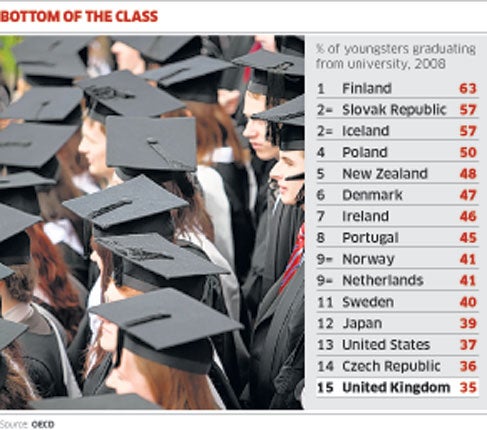Britain falls behind Poland and Slovakia in university tables

Your support helps us to tell the story
From reproductive rights to climate change to Big Tech, The Independent is on the ground when the story is developing. Whether it's investigating the financials of Elon Musk's pro-Trump PAC or producing our latest documentary, 'The A Word', which shines a light on the American women fighting for reproductive rights, we know how important it is to parse out the facts from the messaging.
At such a critical moment in US history, we need reporters on the ground. Your donation allows us to keep sending journalists to speak to both sides of the story.
The Independent is trusted by Americans across the entire political spectrum. And unlike many other quality news outlets, we choose not to lock Americans out of our reporting and analysis with paywalls. We believe quality journalism should be available to everyone, paid for by those who can afford it.
Your support makes all the difference.The UK has lost its edge as a world leader in providing higher education, one of the most authoritative international studies has revealed.
It has plummeted from fourth place to 15th in less than a decade in the percentage of graduates it produces – being overtaken by countries such as Poland and Portugal in the process.
The study's findings prompted dire warnings from lecturers and vice-chancellors' representatives, who said the UK faced relegation from the top league from which it would struggle to recover. The report, by the Organisation for Economic Co-operation and Development (OECD), comes just before a major government review of university finance by the former BP boss Lord Browne and cuts in higher education funding of up to 35 per cent.
The review is said to be moving towards introducing more of a university marketplace through higher fees for students – which would mean lifting the current cap of £3,225 to at least £7,000. Research evidence shows that the majority of students – about two-thirds – would be deterred from going to university if fees reached that level.
Andreas Schleicher, of the OECD's indicators and analysis division, said: "Fewer people with qualifications will mean a less successful economy. Cutting education is going to cut the tax returns of the future. For many years the UK was very much at the forefront [of higher education provision]. But now you do not see that competitive advantage."
The report revealed that the UK's nosedive was not a result of it producing fewer graduates – rather that other countries had expanded their higher education provision at a faster rate. Figures showed the UK was investing less of its Gross Domestic Product in higher education – 1.3 per cent – than the OECD average of 1.5 per cent.
Reaction to the report emphasised the dire financial straits in which universities could soon find themselves. Dr Wendy Piatt, director general of the Russell Group, which represents 20 of the country's leading research institutions including Oxford and Cambridge, said: "While our universities are bracing themselves for a period of austerity and uncertainty, other nations are rightly pumping billions of dollars into their institutions.
"If our universities are hit again in the comprehensive spending review by another wave of cuts, we could well be relegated to a lower division of higher education quality from which we would struggle ever to recover."
A survey carried out by the National Union of Students (NUS) and HSBC revealed that 70 per cent of students felt that fees of up to £7,000 a year would put them off going to university. Aaron Porter, president of the NUS, said: "Student finances are already at breaking point and this is clear evidence of the need to do away with the damaging and unpopular fees system."
However, the feeling within the Browne review is that universities would introduce differential fees rather than immediately charging the maximum amount available to them. It has all but rejected the idea of a graduate tax. Its findings could well fuel a political split between the coalition partners, as the Liberal Democrats opposed any fees increases during their general election campaign.
Subscribe to Independent Premium to bookmark this article
Want to bookmark your favourite articles and stories to read or reference later? Start your Independent Premium subscription today.
Join our commenting forum
Join thought-provoking conversations, follow other Independent readers and see their replies
Comments